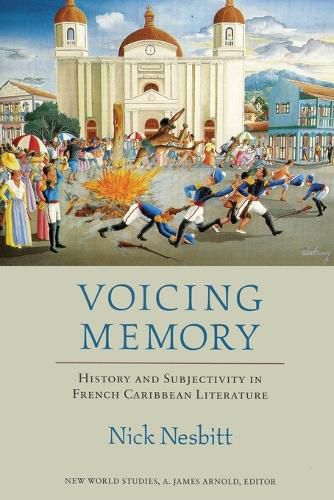Readings Newsletter
Become a Readings Member to make your shopping experience even easier.
Sign in or sign up for free!
You’re not far away from qualifying for FREE standard shipping within Australia
You’ve qualified for FREE standard shipping within Australia
The cart is loading…






In Voicing Memory Nick Nesbilt argues that the aesthetic practices of twentieth-century French Caribbean writers reconstruct a historical awareness that had been lost amid the repressive violence of slavery, the plantation system, and colonial exploitation. Drawing on the work of Aime Cesaire, Edouard Glissant, Daniel Maximin, Maryse Conde, and Edwidge Danticat, he shows how these writers use the critical force of the aesthetic imagination to transform the parameters of Antillean experience. The author takes the aesthetic practices of the black Atlantic - Antillean poetry, literature, and theater, but also Haitian vodou and visual arts, American jazz, and West African musical traditions - to constitute the models informing this Caribbean vernacular historiography. At the same time, Nesbitt shows how concepts from Cesaire’s
negritude
to Glissant’s
relation
critically rework European theoretical influences to construct a black Atlantic historical self-consciousness. In so doing, Nesbitt points beyond the regionalism of Antillean exoticism to describe French Caribbean literature as a decisive intervention in the construction of a global modernity.
$9.00 standard shipping within Australia
FREE standard shipping within Australia for orders over $100.00
Express & International shipping calculated at checkout
In Voicing Memory Nick Nesbilt argues that the aesthetic practices of twentieth-century French Caribbean writers reconstruct a historical awareness that had been lost amid the repressive violence of slavery, the plantation system, and colonial exploitation. Drawing on the work of Aime Cesaire, Edouard Glissant, Daniel Maximin, Maryse Conde, and Edwidge Danticat, he shows how these writers use the critical force of the aesthetic imagination to transform the parameters of Antillean experience. The author takes the aesthetic practices of the black Atlantic - Antillean poetry, literature, and theater, but also Haitian vodou and visual arts, American jazz, and West African musical traditions - to constitute the models informing this Caribbean vernacular historiography. At the same time, Nesbitt shows how concepts from Cesaire’s
negritude
to Glissant’s
relation
critically rework European theoretical influences to construct a black Atlantic historical self-consciousness. In so doing, Nesbitt points beyond the regionalism of Antillean exoticism to describe French Caribbean literature as a decisive intervention in the construction of a global modernity.